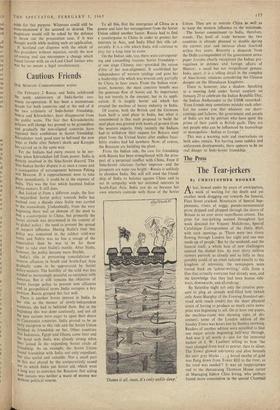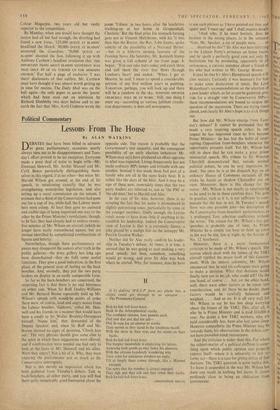The Press
The Tear-jerkers
By CHRISTOPHER BOOKER
Alast, bowed under by years of anticipation, a week of waiting for the death and yet another week dragging out towards the funeral, Fleet Street cracked. Mountains of Special Sup- plements, rivers of soggy, pseudo-monumental prose dripped and plopped through the doors of Britain in an ever more superfluous stream. The prize for tear-jerking seemed throughout last week destined for Vincent Mulchrone, Special Catafalque Correspondent of the Daily Mail, with such openings as 'There were two rivers flowing through London last night and one was made up of people.' But by the weekend, and the funeral itself, a whole host of new challengers entered the dismal lists. As over thirty million viewers partook as closely and as fully as they possibly could of an event tailored exactly to the kingdom of television, the newspapers were forced back on 'colour-writing,' stills from a film that virtually everyone had already seen, and the knowledge that they had been beaten side- ways, downwards, and all ends up.
By Saturday night not only the creative pres- sure to plug an already well-filled hole (which only Anne Sharpley of the Evening Standard with much credit) but the sheer physical strain of having to produce so much extra news- print was beginning to tell. On at least one paper, the machine-room was showing signs of dis- content; some of the London edition of the Sunday Times was hours late by Sunday morning. Readers of another edition were mystified to find
one major article beginning half-way through. And was it all worth it—just for the immortal
bathos of J. W. Lambert telling us how 'the
river changed from lead to pewter, then to silver. The Tower glowed ash-tawny and alive beneath the inert grey blocks .. . a broad swathe of gold was flung down from Tower Hill to the river, as the road was sanded'? It was an inappropriate end to the dynamising Thomson House career of Managing Editor Clive Irving, who perhaps found more consolation in the special Churchill Colour Magazine, two years old but vastly superior to the competition.
By Monday, when one would have thought the nation had all but had enough, the drooling had found a new focus. 6125,000 QUEUE AT BLADON' headlined the Sketch. '80,000, QUEUE AT BLADON'. answered the Guardian. '70,000 QUEUE AT BLADON' shouted the Sun, following it up with Anthony Carthew's headline revelation that 'THE IMPORTANT THING ABOUT BLADON YESTERDAY WAS THAT ONLY 49 OF US TURNED UP FOR MORNING CHURCH.' For half a page of exclusive 'I was there' disclosures of that calibre, Mr. Carthew must have thought it was almost worth getting up ,in time for matins. The Daily Mail was on the ball again—the only paper to quote the 'poem' which had been read out on television by Richard Dimbleby two days before and to un- earth the fact that 'Mrs. Avril Crabtree wrote the poem 'Tribute' in two hours after the lunchtime washing-up at her home in Grappenhall, Cheshire.' But the final prize for stomach-turning goes not to Vincent Mulchrone, with his it was then that the Rector, the Rev. John James, spoke soberly of the possibility of a National Shrine' —but to a hitherto unsung laureate of the Evening News. On Saturday, Mr. Kenneth Stamp was given a full columri of the front page. It began : 'You can take tears today and catch them and call them the river that flows through London's heart' and ended : 'When I get to Heaven, he said, I mean to spend a considerable portion of my first million years in painting. Tomorrow, perhaps, you will look up and there will be a rainbow in the sky. WINSTON SPENCER CHURCHILL WILL BE AT WORK.' Still, one thing I must say—according to Various jubilant circula- tion departments, it does sell newspapers.



































 Previous page
Previous page